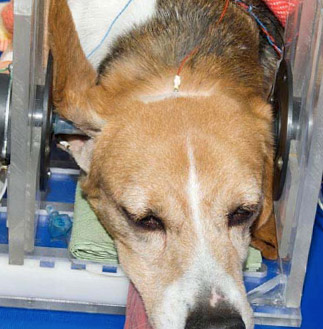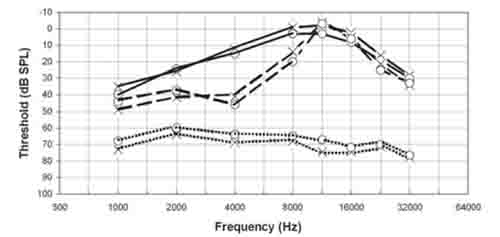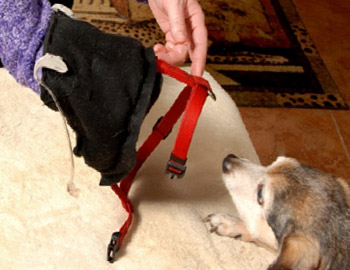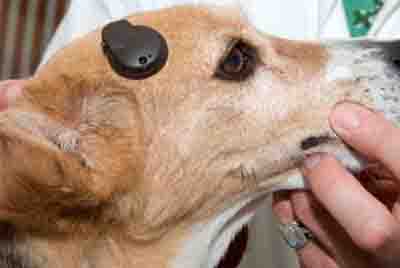Summary:
"Deafness in dogs can be due to an inherited condition or a disease such as an untreated infection. Hearing loss can also be brought on by noise, medications or is age-related (ARHL or presbycusis).
Signs of deafness include being unresponsive to sounds such as a toy that makes noise, or if a dog doesn't awaken after a loud noise. Dogs with hearing loss in one ear can have trouble in localizing a sound source. Some causes of deafness result in a permanent hearing loss while others could be temporary. It is often difficult for an owner to detect the slow progression of deafness in dogs since a pet will try and compensate for the hearing loss.
Diagnosis includes a physical examination and neurological examination. Advanced imaging tests (MRI or CT scan) are needed for a full evaluation of the inner and middle ear. Other methods such as a test of the nerve impulses generated by the cochlea is conducted using a BAER test. Treatment starts with the elimination of any disease or debris. Genetic disorders cannot be treated. Use of dog hearing aids and advanced methods such as cochlear implants are not commonly recommended or used. Puppy deafness requires special training.
Hearing loss can affect the relationship between the owner and dog since a dog cannot respond to sounds. If your dog is deaf this can be overcome with counseling and special training. Being deaf is not linked to other health congenital health problems or concerns. Deaf dogs are also not more aggressive."

Overview
Deafness in dogs is either an inherited condition or is a result of disease such as an untreated chronic ear infection (otitis externa). Deafness is characterized as being permanent or temporary, partial or complete. Dogs can be born deaf, a condition that cannot be corrected (congenital deafness). There are several breeds that have this genetic condition such as Dalmatians, which is why responsible breeding is critical. Sudden hearing loss in dogs is rare, with most cases developing over time as a condition develops. Correction of the problem, such as the removal of excessive wax often restores hearing, assuming the issue did not breach the eardrum.
Deafness in puppies is detected in dogs that learn slowly and that do not respond to an owner's voice of commands. In an older dog, signs include a lack of response to verbal cues and a dog that does not respond or wake up when an owner returns from work.
Home tests for deafness include seeing if a dog responds to a rattling of your keys or a toy that squeaks. Try clapping your hands behind the dog or whistling to see if it evokes a response.
Predisposing and Perpetuating Factors
Certain breeds are predisposed to developing deafness. This includes dogs withe white in their coats and Dalmatians (30% incidence of deafness). The Cavalier King Charles Spaniel has what is called progressive hereditary deafness, with the first signs at age 3 to 4 years of age. Other dogs show signs of deafness as a puppy.
Cocker Spaniels are prone to excessive ear wax production which can cause some hearing loss or create an environment for infection.
Breeds with an above average incidence of deafness at birth (dogs with white in their coats):
- Collies
- Shetland Sheepdogs
- Dappled Dachshunds
- Harlequin Great Danes
- American Foxhounds
- Old English Sheepdogs
- Norwegian dunkerhounds
- Bull Terriers
- Samoyeds
- Greyhounds
- Great Pyrenees
- Sealyham Terriers
- Beagles
- Bulldogs
- Dalmatians
- English Setters
- Australian Shepherds
- Welsh Corgis
Common Causes
Infection is an external ear canal disease (otitis externa) that can cause deafness in dogs. When it is not treated, the infection can progress to the middle and inner ear. When a dog's ears fill with wax, mite debris and pus, sound waves are blocked from reaching the eardrum. This blockage can be partial or complete, causing varying degrees of hearing loss.
Factors that lead to frequent dog ear infections include moisture from swimming, living in a humid environment or excessive wax production.
Ear Infections
Dog ear infections that are left untreated can breach the eardrum, resulting in impaired or permanent hearing loss. This type of hearing loss is called acquired conductive hearing loss.
Any deafness caused by disease tends to develop over time.
Ototoxicity
Ototoxicity is a term that describes dog ear poisoning, which is a result from being exposed to chemicals or drugs that damage the nerve that communicates hearing and balance information to the brain from the inner ear, or that damages the inner ear. Hearing loss occurs when toxins are ingested or enter into the inner ear via a perforated eardrum. Some conditions are reversible while others are not. The key is to detect and treat the problem as early as possible.
Causes of ototoxicity include:
- antibiotics (certain medications)
- ear cleaners
- household chemicals
- chemotherapy drugs
NIHL
Hearing loss can also be noise-induced (NIHL).
Age Related Hearing Loss
Age related hearing loss in dogs is common (also called ARHL or presbycusis). It is also the most common form in people. With age there is some degeneration in the inner ear. This can occur with or without signs of infection. Researchers believe that is it caused by the life-long effects of noise, ototoxic agents (medications, chemicals), heredity and disease.
In dogs researchers have seen age related hearing loss start between 8 to 10 years of age in the middle to high frequencies. The mean age was 12 years.

Source: Gert ter Haar Veterinary Sciences Tomorrow
Symptoms
Look for signs and symptoms of hearing loss or dog ear illnesses. These include:
- head shaking
- ear scratching
- ear odor
- exaggerated barking
- sleeping through sounds, no response to sound
- being startled when touched
- not responding to an owner's voice or when called
- no response when returning home from work
- confusion to commands that were previously understood
- reduced levels of activity
- difficulty waking the dog
- excessive barking
- disorientation, confusion
- agitation in familiar places
Diagnosis
Diagnosis of deafness in dogs is relatively easy. First the veterinarian will conduct a physical examination while looking for signs of external or middle ear disease. Brain related problems can be detected with tests such as a MRI, CT scan or a BAER test (brain stem auditory evoked response).
How Dog BAER Tests Work
The BAER test evaluates how the brain stem reacts to an auditory stimulus. A neurologist conducts that test using a 10-minute procedure. First headphones or ear plugs are placed on the dog. Tones or clicks are then played through the headphones. Electrodes inserted under the skin measure electrical response in the brain to the sounds.
Treatment
If hearing loss is genetic, there is no treatment available. When the hearing loss is acquired, which means it is the result of disease, medications can be used to treat the canine ear problem. If the disease progresses to the point where the eardrum becomes ruptured, the hearing loss will be permanent and complete.
No matter the degree of hearing loss, from partial to complete, dogs are good at adapting. Dogs that are deaf tend to pay added attention to their surroundings, making them easy to train. They will rely on other senses and live a happy life.

Photo Credit: FetchLab
Dog Hearing Aids
There is a dog hearing aid option for some dogs. They are not commonly used, but are actively being researched. Hearing aids for dogs are expensive and many dogs do not tolerate the devices. Using amplification of sound, which is what a hearing aid accomplishes hasn't achieved high levels of clinical success and there are no reports available on their effectiveness.
If hearing aids are being considered, a dog will be examined to see if he or she is a good candidate. Dogs need to pass a minimum threshold for hearing in order to effectively use the devices. This level can be determine with the BAER response test described above. In the laboratory dogs with hearing aids had to be trained to recognize sounds as being meaningful.
Dog Cochlear Implants and Prostheses
Like hearing aids, there are dog cochlear implants and prostheses. The devices address shortcomings of traditional hearing aids by providing acoustic amplification and transmission of sound energy along with a vibratory element called a transducer directly to the middle ear.
Middle Ear Implant
The Vibrant Soundbridge (VSB) middle ear implant is the only middle ear implantable hearing device available in the United States. While studies in humans have shown some success, there are not studies on the use of the device in dogs. However, it has been shown that the device can be successfully implanted in dogs.

Photo Credit: Veterinary Sciences Tomorrow
The cost is high, $20,000 to $25,000 (U.S. Dollars) plus the cost of surgery and post-surgery training. Cochlear implants in dogs are not consider to be a practical option.
Taking Care of a Deaf Dog
Dogs can use other senses to compensate for any hearing loss and can lead a good quality of life. That said, steps need to be taken to improve the safety of a deaf dog. These include:
- Training a deaf dog on how to recognize hand gestures or other visual types of communication. Like all training consistency is critical such as touching a dog in a specific place in order to indicate a desired behavior. Use food rewards or a vibration collar to reinforce commands. Food should be paired with the vibration so that the vibration becomes a positive experience.
- Attach a bell to the dog's collar to make it easier for a pet parent (you) to find your dog
- Try and avoid startling a deaf dog. Alert your dog to your presence by creating vibrations through stomping of the fee or clapping the hands. Best to approach from the front and not the rear.
- Keep your dog indoors to protect them from threats that are usually detected via sound such as a car.
- Protect your dog when walking in the park. Your pet cannot hear other dogs or understand potential threats. They can also have trouble understanding the actions of small children and should be watched carefully since they can be a biting risk. Children are difficult for dogs to interpret without the help of sound.
- Physical fencing can protect a dog outdoors.
Dog Sign Language
Some trainers have developed a dog sign language to help train a deaf dog. Signs include:
- Sit Command: Use a flat hand with the palm up. For training hold a treat between the index finger and thumb, holding other 3 fingers out. Move your hand slowly from the front of the face to over the head and back. The dog will follow the treat, with many dogs automatically assuming a sitting position. Provide a treat immediately at that point.
- Down Command: Hold the hand flat and your palm down. Also place the treat between the index finger and thumb. Move your hand from the front of the nose to angle with the floor. Start by touching the floor, with the nose following the treat. Use your other hand to gently press on the back end of the dog. Repeat again and back your and away.
Create your own signs for meal times, walks, going to the bathroom etc.
Deaf dogs will learn from facial expressions and other cues.
For more suggestions see the ebook below on training a deaf dog.
Prevention
Keeping dog ears free from debris, mites and infection is the first
step in preventing ear disease in dogs. Start by examining the ears
regularly, and look for signs such as inflammation, discharge and
swelling. Look for symptoms such as constant ear scratching.
A dog might also benefit from additional support with a product like Ear Dr. that is formulated to naturally support ear health.
Brochures and Further Reading on Canine Deafness
Books:
Through A Dark Silence: Loving and Living
with Your Blind and Deaf Dog
Helpful information on living with a
training a deaf dog
Written by: Debbie Bauer
Published by: Debbie Bauer
Date published:
12/13/2013
Available in
Ebook
Websites on deafness in dogs:
Ask Our Vet A Question About Deafness in Dogs and We Will Answer It For Free
Have a Question on Deafness in Dogs for our Veterinarian, We'll Answer It For Free!
Do you have a deafness or hearing related question for our Veterinarian or a Helpful Story to Share? Please include information such as age, sex, breed, medical history and picture of the condition if you can.
We will do our best to get back to you quickly (depends on how many questions we receive each day). If you do require an immediate response we suggest using this online dog veterinary service that is available now.
References
Brain stem Evoked Response Audiometry for Hearing Assessment in Dogs
Gert Ter Haar, DVM, DECVS
Department of Clinical Sciences of Companion Animals
Faculty of Veterinary Medicine
PO Box 80 154
3508 TD Utrecht
The Netherlands
Strain GM. Aetiology, prevalence and diagnosis of deafness in dogs and cats.
Br Vet J 1996;152:17-36.
Treatment of Hearing Losses
G. Ter Haar
The Queen Mother Hospital for Animals
Royal Veterinary College
North Mymms, Hatfield, Hertfordshire, UK
